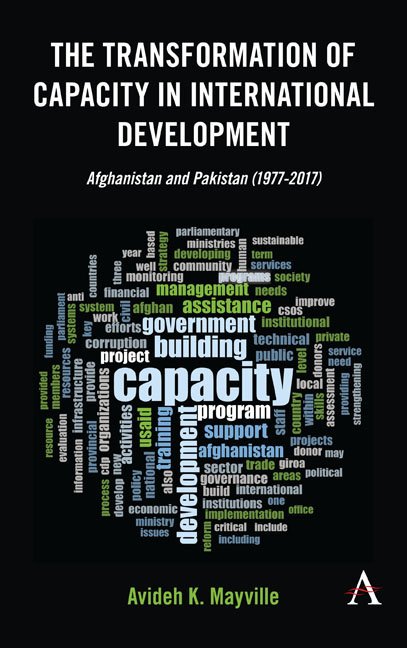Book contents
- Frontmatter
- Dedication
- Contents
- List of Figures
- Acknowledgments
- Chapter One Introduction
- Chapter Two Development Agendas and Donor Spaces: How Capacity Gained Salience
- Chapter Three Capacity in Development Policy and Practice: The Quest for Performance Excellence in the Governance of Disabling Environments
- Chapter Four Capacity and Fragility: The Sociological Framework for the Capacity Project and Developing “Fragile” States
- Chapter Five The Capacity Project in “AfPak”: Development Experiments, Subnational Spaces, and Transnational Networks
- Chapter Six The Battle for Power in Disabling Environments: Statecraft and Developing Capacity in Afghanistan and Pakistan
- Chapter Seven Developing Capacity to Manage Global Threats: Statemaking, the Militarization of Development, and Human Rights Approaches
- References
- Index
Chapter Four - Capacity and Fragility: The Sociological Framework for the Capacity Project and Developing “Fragile” States
Published online by Cambridge University Press: 11 December 2019
- Frontmatter
- Dedication
- Contents
- List of Figures
- Acknowledgments
- Chapter One Introduction
- Chapter Two Development Agendas and Donor Spaces: How Capacity Gained Salience
- Chapter Three Capacity in Development Policy and Practice: The Quest for Performance Excellence in the Governance of Disabling Environments
- Chapter Four Capacity and Fragility: The Sociological Framework for the Capacity Project and Developing “Fragile” States
- Chapter Five The Capacity Project in “AfPak”: Development Experiments, Subnational Spaces, and Transnational Networks
- Chapter Six The Battle for Power in Disabling Environments: Statecraft and Developing Capacity in Afghanistan and Pakistan
- Chapter Seven Developing Capacity to Manage Global Threats: Statemaking, the Militarization of Development, and Human Rights Approaches
- References
- Index
Summary
The previous chapter examined how capacity as a concept gained salience within donor spaces, moving from agendas to institutional frameworks to finally be implemented within projects. A concept gains salience by becoming a common theme or underlying thread within varying discourses, primary areas of stakeholder collaboration, and when it becomes subsumed within overarching narratives that drive forth the reality of the spaces within which actors operate. As a concept of practice, capacity lives everywhere and across all issue areas. It is in many ways an all-consuming concept that only gains substance when within the context of other concepts. As we work toward a conceptual framework of understanding for capacity, this teasing out major discursive relationships is tedious, but necessary. This chapter is about the relationship of “capacity” to another pervasive, descriptive concept that has implications for development strategy, global security concerns, and the prevention of mass human rights violations: “fragility.”
As this term is generally used as a descriptor for the status of states, and much of capacity building has to do with the building of the state, this chapter approaches the relationship between these two concepts first through an examination of sociological frameworks for understanding projects of capacity and later through the lens of USAID's involvement in counterinsurgency operations, which is particularly relevant as we consider fragility. The scholarly frameworks I examine explain capacity building as a community-building project and identify major themes of capacity building as state power, community, and social capital, using examples from the Global North to conceive of the construction of capacity through the lens of frames and habitus. These frameworks are both illuminating and limiting for an analysis of donor-driven capacity-building efforts in states deemed “fragile,” such as Afghanistan and Pakistan. I juxtapose these examples against the context of the case this book examines, examining these limitations and exploring the ramifications of them when considering the question of capacity as it relates to fragility within the context of statebuilding. This leads into a discussion on the role of security within development agendas and fragility as a designation for states deemed lacking in capacity, as well as how rights-based approaches to development fit into this framework for statebuilding.
- Type
- Chapter
- Information
- The Transformation of Capacity in International DevelopmentAfghanistan and Pakistan (1977–2017), pp. 73 - 108Publisher: Anthem PressPrint publication year: 2019



